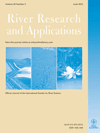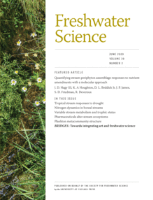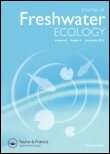
LAKE AND RESERVOIR MANAGEMENT
metrics 2024
Fostering interdisciplinary collaboration for better water management.
Introduction
LAKE AND RESERVOIR MANAGEMENT is a premier academic journal published by Taylor & Francis Inc, providing a dedicated platform for the dissemination of high-quality research and innovations in the field of aquatic management. With an ISSN of 1040-2381 and an E-ISSN of 2151-5530, the journal encompasses a broad spectrum of topics related to the sustainable management and ecological assessment of lakes and reservoirs. As an essential resource for researchers, professionals, and students involved in environmental science, hydrology, and water resource management, the journal aims to address critical issues such as water quality, ecosystem services, and the impact of human activities on aquatic systems. Additionally, the journal promotes interdisciplinary approaches that foster collaborative solutions for effective management of aquatic resources. Although it currently does not offer open access, LAKE AND RESERVOIR MANAGEMENT remains influential in shaping policies and practices within the field, making it a vital read for anyone dedicated to advancing knowledge and practice in aquatic ecosystem management.
Metrics 2024
 -
- 1.10
1.10 1.80
1.80 -
-Metrics History
Rank 2024
IF (Web Of Science)
JCI (Web Of Science)
Quartile History
Similar Journals

LIMNETICA
Unveiling insights into the world's freshwater habitats.LIMNETICA is a prestigious academic journal dedicated to advancing the field of Aquatic Science, Ecology, and Water Science and Technology. Published by the Asociación Española de Limnología in Spain, this journal serves as a vital platform for researchers and professionals seeking to share their findings and insights from 1996 to 2024. With a commendable Q2 ranking in Ecology and notable Q3 rankings in Aquatic Science and Water Science and Technology, LIMNETICA emphasizes high-quality, peer-reviewed research that contributes to our understanding of freshwater ecosystems. Although currently not classified under Open Access, its rigorous indexing and Scopus rankings—positioning it in the top 64th percentile for Environmental Science—illustrate its impact in the scientific community. Researchers, students, and professionals are encouraged to engage with LIMNETICA to stay abreast of key developments and foster collaborative efforts in aquatic research.

RIVER RESEARCH AND APPLICATIONS
Unveiling Insights into River Science and ApplicationsRIVER RESEARCH AND APPLICATIONS, published by WILEY, stands as a pivotal journal in the fields of Environmental Science, Water Science and Technology, and Environmental Chemistry. With an impressive Impact Factor signifying its influential presence, this journal offers a platform for high-quality research and applications related to river ecosystems and water resources. The journal operates under a hybrid access model, allowing for both subscription-based and open-access options, thus promoting accessibility and widespread dissemination of knowledge. Since its inception in 1996, RIVER RESEARCH AND APPLICATIONS has maintained a distinguished reputation, reflected in its ranking within the Q2 quartiles of major categories like Environmental Chemistry and Water Science. Engaging researchers, practitioners, and students alike, the journal is committed to publishing cutting-edge studies that foster a deeper understanding of river dynamics and their environmental implications, making it an essential resource for contributors advancing the sustainable management of water environments.

Freshwater Science
Connecting Researchers for a Thriving Aquatic FutureFreshwater Science is a pivotal journal published by the University of Chicago Press, dedicated to advancing the understanding of freshwater ecosystems and their biodiversity. With an ISSN of 2161-9549 and an E-ISSN of 2161-9565, this journal has been a vital resource in the fields of Aquatic Science and Ecology, consistently ranked in the Q2 quartile across multiple categories in 2023. The journal encapsulates rigorous research and innovative studies aimed at addressing the ecological dynamics of freshwater environments from 2012 to 2024. Researchers and practitioners benefit from its open access options, which enhance the dissemination of knowledge while contributing to a better understanding of aquatic systems. With Scopus rankings that place it in the top 30% of its fields, Freshwater Science plays an influential role in fostering scientific dialogue and collaboration among professionals, making it an essential publication for anyone invested in freshwater conservation, management, and ecological impact.

Limnology and Oceanography Letters
Fostering interdisciplinary collaboration in aquatic research.Limnology and Oceanography Letters, published by WILEY, is an esteemed peer-reviewed journal dedicated to advancing our understanding of freshwater and marine systems. With an impressive Q1 ranking in both Aquatic Science and Oceanography, this journal has established itself as a pivotal resource for researchers, professionals, and students alike. Since its inception as an Open Access journal in 2016, it has provided unrestricted access to high-quality, innovative research articles that illuminate diverse aspects of aquatic ecosystems and their dynamics. With a publication history from 2016 to 2024 and a significant presence in Scopus rankings—placing it in the top 6% for Oceanography and the top 8% for Aquatic Science, this journal not only fosters scholarly communication but also encourages interdisciplinary collaboration. Addressing pressing issues related to water resource management, climate impact, and ecological integrity, Limnology and Oceanography Letters remains essential for those dedicated to the science of aquatic environments.

Inland Waters
Transforming Knowledge into Action for Water StewardshipInland Waters, published by TAYLOR & FRANCIS LTD, stands as a prestigious scholarly journal dedicated to the critical examination of freshwater ecosystems and their management. With an ISSN of 2044-2041 and an E-ISSN of 2044-205X, this journal boasts a remarkable Q1 ranking in both Aquatic Science and Water Science and Technology for 2023, reflecting its significant impact in the field. Researchers and professionals can benefit from its comprehensive coverage of cutting-edge research, methodological advancements, and policy implications concerning inland waters. Committed to disseminating valuable knowledge in a vital area of environmental science, Inland Waters aims to foster collaboration and promote innovative solutions for sustainable water management practices. As it continues through its converged years from 2012 to 2024, the journal remains an essential resource for those dedicated to advancing our understanding and stewardship of freshwater environments worldwide.

WETLANDS ECOLOGY AND MANAGEMENT
Championing effective strategies for wetland preservation.Wetlands Ecology and Management, published by Springer, is an esteemed journal that has been advancing the field of wetland studies since its inception in 1982. Operating under the ISSN 0923-4861 and E-ISSN 1572-9834, this journal is headquartered in the Netherlands and serves as a critical resource for researchers, professionals, and students alike. It fosters interdisciplinary dialogue among aquatic science, ecology, and resource management disciplines, ranking in the Q2 category for Aquatic Science and Ecology, Evolution, Behavior and Systematics as of 2023. With a notable Scopus ranking, it is positioned favorably within the 65th percentile in Ecology and a commendable 58th percentile in Aquatic Sciences. The journal emphasizes the importance of effective management strategies and policies in the conservation of wetlands, making it indispensable for those aiming to drive impactful research. Although it is not an open-access journal, its high-quality publications remain accessible through library consortia and institutional subscriptions, ensuring that pertinent insights into the ecological dynamics and sustainable management practices are available to the global research community.

MARINE AND FRESHWATER RESEARCH
Pioneering insights into aquatic ecology and sustainability.Marine and Freshwater Research is a prestigious journal published by CSIRO PUBLISHING that serves as a key platform for the dissemination of cutting-edge research in the fields of Aquatic Science, Ecology, and Oceanography. With an impactful presence since its inception in 1948, the journal provides critical insights into the dynamics of freshwater and marine ecosystems, promoting interdisciplinary approaches that contribute to our understanding of biodiversity and sustainability. Currently ranked in the Q2 category across major scientific domains, including Ecology and Aquatic Science, it enjoys a robust academic reputation supported by impressive Scopus rankings, such as Rank #66/247 in Aquatic Science and Rank #44/145 in Oceanography, reflecting its high citation impact and relevance. While offering a subscription-based access model, the journal remains dedicated to fostering dialogue and innovation within the scientific community, aiming to bridge the gap between research findings and practical applications in environmental management. Located in Australia, Marine and Freshwater Research is an essential resource for researchers, professionals, and students dedicated to exploring the complexities of aquatic ecosystems and advocating for their preservation.

JOURNAL OF FRESHWATER ECOLOGY
Driving impactful research for ecological conservation.JOURNAL OF FRESHWATER ECOLOGY, published by Taylor & Francis Inc, is an esteemed source of research dedicated to advancing the understanding of freshwater ecosystems. Established in 1981, this Open Access journal has provided a platform for innovative studies and groundbreaking articles relevant to the fields of Aquatic Science and Ecology. With its HIndex reflecting a commitment to quality scholarship, the journal is currently classified in the Q3 category for both Aquatic Science and Ecology, Evolution, Behavior and Systematics, indicating its respectable impact within these disciplines. The journal ranks within the 45th percentile in Ecology and the 41st percentile in Aquatic Science on Scopus, highlighting its relevance to a global audience of researchers and practitioners. By facilitating unrestricted access to research findings since 2017, JOURNAL OF FRESHWATER ECOLOGY aims to enrich our understanding of freshwater systems and their conservation, making it an essential resource for those invested in ecological research and environmental sustainability.

Journal of Ecohydraulics
Championing interdisciplinary research in civil engineering and water science.The Journal of Ecohydraulics, published by Taylor & Francis Ltd, stands as a premier platform for interdisciplinary research, merging the disciplines of civil engineering, water science, and environmental management. With an ISSN of 2470-5357 and an E-ISSN of 2470-5365, this esteemed journal, based in the United Kingdom, has been recognized within the top quartile (Q1) in both Civil and Structural Engineering and Water Science and Technology categories. Its impactful research, reflected in its notable Scopus rankings—#40 out of 261 in Environmental Science and #69 out of 379 in Engineering—underscores its vital role in advancing knowledge and addressing the critical challenges posed by the interaction of ecological and hydraulic systems. The journal invites contributions that explore innovative methodologies and sustainable practices relevant to ecohydraulics, fostering a robust dialogue among researchers, professionals, and students interested in the sustainable management of aquatic and terrestrial environments.

Journal of Oceanology and Limnology
Diving Deep into Aquatic Science DiscoveriesJournal of Oceanology and Limnology, published by SCIENCE PRESS, is a premier academic journal dedicated to advancing the fields of oceanography and limnology. With an ISSN of 2096-5508 and E-ISSN 2523-3521, this journal has emerged as a vital resource since its inception, aiming to disseminate cutting-edge research and comprehensive studies on aquatic environments. Based in China and indexed with notable rankings in Scopus, including a Q2 category in Oceanography and a Q3 category in Water Science and Technology, this journal significantly contributes to knowledge in these crucial scientific disciplines. The H-index for the journal is currently being established, reflecting its evolving impact within the academic community. Moreover, the open access model promotes wider dissemination, ensuring that research findings are accessible to a global audience. Covering a diverse range of topics from ecosystem health to climate impact on water bodies, the Journal of Oceanology and Limnology aspires to foster interdisciplinary dialogue and innovation among researchers, professionals, and students engaged in understanding and preserving aquatic life.